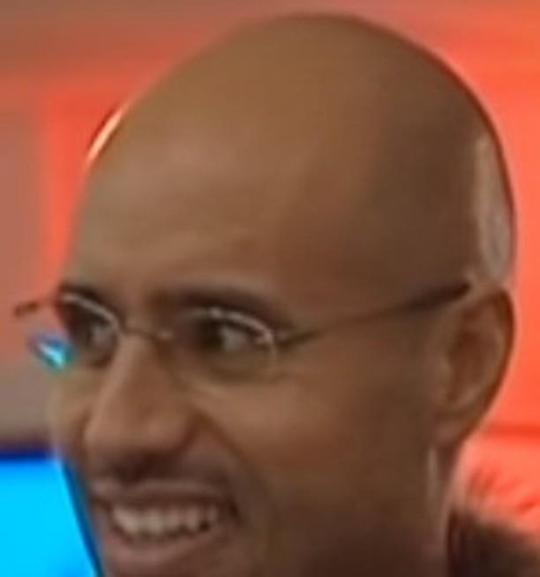#Saif al-Islam Gaddafi
Text
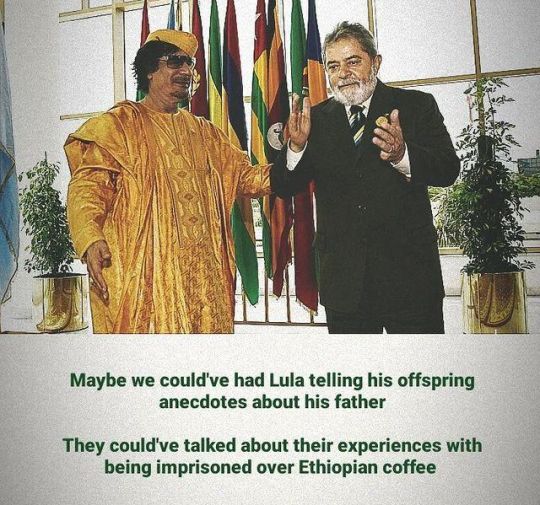
Context: Lula met Libyan Presidential Council Chairman Mohamed al-Menfi in Addis Ababa today
#Luiz Inacio Lula da Silva#Lula da Silva#Lula#Brazil#Brasil#Gaddafi#Muammar Gaddafi#Saif al-Islam Gaddafi#Gaddafis#Libya#African Union#African Union summit#37th African Union summit#Addis Ababa#Ethiopia#Ethiopian coffee#Africa
7 notes
·
View notes
Text
Is Saif al-Islam Gaddafi an alternative to Libya's two warring factions?
As Libya continues to grapple with the ongoing conflict between its two warring factions, the question arises: could Saif al-Islam Gaddafi be the solution the country needs? Saif al-Islam, the son of the late Libyan leader Muammar al-Gaddafi, has emerged as a potential alternative in the country’s political landscape.
Saif al-Islam Gaddafi, known for his controversial role during his father’s…
View On WordPress
0 notes
Text
Call to arms in Libya
Saif al-Islam Gaddafi:
People of Libya, I came with great sadness today, The United States of America has officially invaded our land, killing my people, destroying my home, your so called 'defending civilians' has only caused destruction in my beloved Libya, I cannot stand and watch you doing such audacity. I will not watch America destroy my beloved homeland, I will fight to the end to defend my land and my people. And I call on all of the Libyan people and the world to join me in this struggle against imperialism and colonialism.
0 notes
Text
12 Years Since NATO Bombed Libya, Gaddafi’s Ex-Spox. Gives Exclusive Update on Saif Al-Islam
On this episode of Going Underground, we speak to late Libyan leader Muammar Gaddafi’s former spokesperson Moussa Ibrahim, 12 years after NATO attacked Libya. He discusses the legacy of chaos and destruction of the US-UK-France-led regime change campaign in Libya and how the West continues to control Libya and provides an exclusive update on Saif Al-Islam Gaddafi, the son of the former Libyan…
View On WordPress
0 notes
Link
0 notes
Text
Gaddafis Sohn könnte Libyen wieder einigen
Gaddafis Sohn, Saif Al-Islam, kann Libyer im nationalen Interesse wieder vereinen, so sein Anwalt gegenüber Russia Today. Der Sohn des von der NATO ermordeten ehemaligen Staatschefs Muammar Gaddafi, Saif Al-Islam, der in diesem Jahr bei den Präsidentschaftswahlen antreten will, wird von den einfachen Menschen unterstützt, die hoffen, Libyen vor dem Chaos der von der NATO […] http://dlvr.it/QN2pcR
1 note
·
View note
Photo
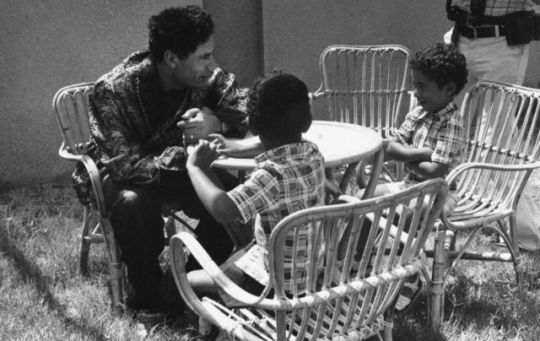
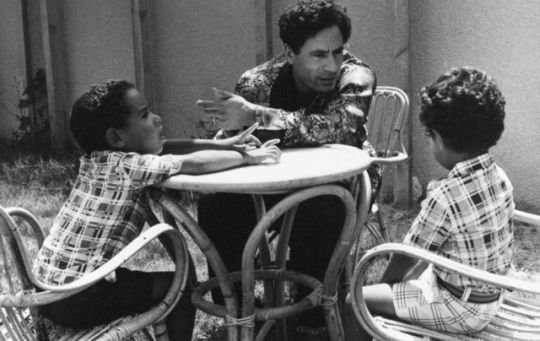
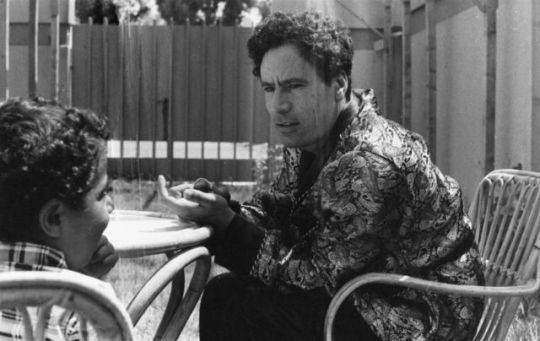
@kirstythejetblackgoldfish :D
14 notes
·
View notes
Text
#Gaddafi#Muammar Gaddafi#Saif al-Islam Gaddafi#Gaddafis#Libya#a very informative article#i really like Mustafa Fetouri#Mustafa Fetouri
9 notes
·
View notes
Text
The Libya Revolution
Muammar Gaddafi was the head of the Free Officer's, a group of Arab nationalists that deposed King Idris I in 1969 in a 'bloodless coup.[51] He abolished the Libyan Constitution of 1951, considering it a neo colonial document. From 1969 until 1975 standards of living, life expectancy and literacy grew rapidly, and in fact continued up until the NATO intervention in March 2011.[52] In 1975 he published his manifesto The Green Book. He officially stepped down from power in 1977, and subsequently claimed to be merely a "symbolic figurehead" until 2011, with the Libyan government up until then also denying that he held any power.[53][54]
Under Gaddafi, Libya was theoretically a decentralized, direct democracy[55] state run according to the philosophy of Gaddafi's The Green Book, with Gaddafi retaining a ceremonial position. Libya was officially run by a system of people's committees which served as local governments for the country's subdivisions, an indirectly elected General People's Congress as the legislature, and the General People's Committee, led by a Secretary-General, as the executive branch. According to Freedom House, however, these structures were often manipulated to ensure the dominance of Gaddafi, who reportedly continued to dominate all aspects of government.[56]
WikiLeaks' disclosure of confidential US diplomatic cables revealed US diplomats there speaking of Gaddafi's "mastery of tactical manoeuvring".[57] While placing relatives and loyal members of his tribe in central military and government positions, he skillfully marginalized supporters and rivals, thus maintaining a delicate balance of powers, stability and economic developments. This extended even to his own sons, as he repeatedly changed affections to avoid the rise of a clear successor and rival.[57]
Both Gaddafi and the Libyan Arab Jamahiriya, however, officially denied that he held any power, but claimed he was merely a symbolic figurehead.[53][54] While he was popularly seen as a demagogue in the West, Gaddafi always portrayed himself as a statesman-philosopher.[58]
According to several Western media sources, Gaddafi feared a military coup against his government and deliberately kept Libya's military relatively weak. The Libyan Army consisted of about 50,000 personnel. Its most powerful units were four crack brigades of highly equipped and trained soldiers, composed of members of Gaddafi's tribe or members of other tribes loyal to him. One, the Khamis Brigade, was led by his son Khamis. Local militias and Revolutionary Committees across the country were also kept well-armed. By contrast, regular military units were poorly armed and trained, and were armed with largely outdated military equipment.[59][60][61] According to Saif al-Islam Gaddafi, however, the reason for the country's de-militarization was a reaction to the Iraq War, so that Libya wouldn't be accused of possessing weapons of mass destruction (WMDs) and face the same fate. He also accused NATO of betraying their trust and taking advantage of this weakness to launch an air attack, recommending that other nations build up their military defences in order to avoid facing the same fate as Libya.[62]
Development and corruption
Much of the state's income came from its oil production, which soared in the 1970s. In the 1980s, a large portion of it was spent on arms purchases, and on sponsoring militant groups and independence movements around the world.[63][64]
Petroleum revenues contributed up to 58% of Libya's GDP.[65] Governments with resource curse revenue have a lower need for taxes from other industries and consequently feel less pressure to develop their middle class. To calm opposition, they can use the income from natural resources to offer services to the population, or to specific government supporters.[66] Libya's oil wealth being spread over a relatively small population gave it a higher GDP per capita than in neighbouring states.[67][68][69] Libya's GDP per capita (PPP), human development index, and literacy rate were better than in Egypt and Tunisia, whose Arab Spring revolutions preceded the outbreak of protests in Libya.[70] Libya's corruption perception index in 2010 was 2.2, ranking 146th out of 178 countries, worse than that of Egypt (ranked 98th) and Tunisia (ranked 59th).[71] One paper speculated that such a situation created a broader contrast between good education, high demand for democracy, and the government's practices (perceived corruption, political system, supply of democracy).[70]
An estimated 13% of Libyan citizens were unemployed.[72] More than 16% of families had none of its members earning a stable income, while 43.3% had just one. Despite one of the highest unemployment rates in the region, there was a consistent labor shortage with over a million migrant workers present on the market.[73] These migrant workers formed the bulk of the refugees leaving Libya after the beginning of hostilities. Despite this, Libya's Human Development Index in 2010 was the highest in Africa and greater than that of Saudi Arabia. Libya had welfare systems allowing access to free education, free healthcare, and financial assistance for housing, while the Great Manmade River was built to allow free access to fresh water across large parts of the country.[74]
Some of the worst economic conditions were in the eastern parts of the state, once a breadbasket of the ancient world, where Gaddafi extracted oil.[75][76] Despite improvements in housing and the Great Manmade River allowing access to free fresh water,[74] not much infrastructure beyond this was developed in the region for many years, with the only sewage facility in Benghazi being over 40 years old, and untreated sewage has resulted in environmental problems.[77]
Several foreign governments and analysts have claimed that a large share of the business enterprise was controlled by Gaddafi, his family, and the government.[78] A leaked US diplomatic cable claimed that the Libyan economy was "a kleptocracy in which the government – either the Gaddafi family itself or its close political allies – has a direct stake in anything worth buying, selling or owning".[79] According to US officials, Gaddafi amassed a vast personal fortune during his 42-year leadership.[80] The New York Times pointed to Gaddafi's relatives adopting lavish lifestyles, including luxurious homes, Hollywood film investments, and private parties with American pop stars.[79][81]
Gaddafi claimed he was planning to combat corruption in the state by proposing reforms where oil profits are handed out directly to the country's five million people[82] rather than to government bodies, stating that "as long as money is administered by a government body, there would be theft and corruption."[83] Gaddafi urged a sweeping reform of the government bureaucracy, suggesting that most of the cabinet system should be dismantled to "free Libyans from red tape" and "protect the state's budget from corruption." According to Western diplomats, this move appeared to be aimed at putting pressure on the government to speed up reforms.[82] In March 2008, Gaddafi proposed plans to dissolve the country's existing administrative structure and disburse oil revenue directly to the people. The plan included abolishing all ministries except those of defence, internal security, and foreign affairs, and departments implementing strategic projects.[84] He claimed that the ministries were failing to manage the country’s oil revenues,[85] and that his "dream during all these years was to give power and wealth directly to the people."[86]
A national vote on Gaddafi's plan to disband the government and give oil money directly to the people was held in 2009, where Libya's people's congresses, collectively the country's highest authority, voted to delay implementation. The General People's Congress announced that, out of 468 Basic People's Congresses, 64 chose immediate implementation while 251 endorsed implementation "but asked for (it) to be delayed until appropriate measures were put in place." This plan led to dissent from top government officials, who claimed it would "wreak havoc" in the economy by "fanning inflation and spurring capital flight." Gaddafi acknowledged that the scheme, which promised up to 30,000 Libyan dinars ($23,000) annually to about a million of Libya's poorest, may "cause chaos before it brought about prosperity," but claimed "do not be afraid to experiment with a new form of government" and that "this plan is to offer a better future for Libya's children."[86][87]
Human rights in Libya
Further information: Human rights in Libya
In 2009 and 2011, the Freedom of the Press Index rated Libya the most-censored state in the Middle East and North Africa.[88][89] In contrast, a January 2011 report of the United Nations Human Rights Council, on which the Libyan Arab Jamahiriya sat prior to the uprising, released a month before protests began, praised certain aspects of the country's human rights record, including its treatment of women and improvements in other areas.[90]
The Libyan Arab Jamahiriya's delegation to the United Nations issued a report about human rights in Libya. The report claimed that the country was founded on direct people's democracy that guaranteed direct exercise of authority by all citizens through the people's congresses. Citizens were claimed to be able to express opinions to the congresses on political, economic, social, and cultural issues. In addition, the report claimed that there were information platforms such as newspapers and TV channels for people to express their opinions through. Libyan authorities also argued that no one in the Libyan Arab Jamahiriya suffered from extreme poverty and hunger, and that the government guaranteed a minimum of food and essential needs to people with low incomes. In 2006, an initiative was adopted for providing people with low incomes investment portfolios amounting to $30,000 to be deposited with banks and companies.[91]
The Revolutionary Committees occasionally kept tight control over internal dissent; reportedly, ten to twenty percent of Libyans worked as informants for these committees, with surveillance taking place in the government, in factories, and in the education sector.[92] The government sometimes executed dissidents through public hangings and mutilations and re-broadcast them on public television channels.[92][93] Up to the mid-1980s, Libya's intelligence service conducted assassinations of Libyan dissidents around the world.[92][94]
In December 2009, Gaddafi reportedly told government officials that Libya would soon experience a "new political period" and would have elections for important positions such as minister-level roles and the National Security Advisor position (a Prime Minister equivalent). He also promised that international monitors would be included to ensure fair elections. His speech was said to have caused quite a stir. These elections were planned to coincide with the Jamahiriya's usual periodic elections for the Popular Committees, Basic People's Committees, Basic People's Congresses, and General People's Congresses, in 2010.[95]
Dissent was illegal under Law 75 of 1973, and in 1974, Gaddafi asserted that anyone guilty of founding a political party would be executed.[92] With the establishment of the Jamahiriya ("state of the masses") system in 1977, he established the Revolutionary Committees as conduits for raising political consciousness, with the aim of direct political participation by all Libyans rather than a traditional party-based representative system.[96] In 1979, some of the Revolutionary Committees had eventually evolved into self-appointed, sometimes zealous, enforcers of revolutionary orthodoxy.[96] During the early 1980s, the Revolutionary Committees had considerable power and became a growing source of tension within the Jamihiriya,[97] to the extent that Gaddafi sometimes criticized their effectiveness and excessive repression,[96][97] until the power of the Revolutionary Committees were eventually restricted in the late 1980s.[97]
The Green Book, which Gaddafi authored in the 1970s, was for years the principal text of political education. BBC cited a Libyan who claimed that teachers who called it "rubbish" could face execution.[98] According to the Libyan Government, "the death penalty may not be imposed except in tretribution (qisas) or on persons whose lives endanger or corrupt society."[91]
In 1988, Gaddafi criticized the "excesses" he blamed on the Revolutionary Councils, stating that "they deviated, harmed, tortured" and that "the true revolutionary does not practise repression."[96] That same year, the Libyan Arab Jamahiriya issued the Great Green Document on Human Rights, in which Article 5 established laws that allowed greater freedom of expression. Article 8 of The Code on the Promotion of Freedom stated that "each citizen has the right to express his opinions and ideas openly in People’s Congresses and in all mass media."[90] A number of restrictions were also allegedly placed on the power of the Revolutionary Committees by the Gaddafi government, leading to a resurgence in the Libyan state's popularity by the early 1990s.[97] In 2004, however, Libya posted a $1 million bounty for journalist and governmental critic Ashur Shamis, under the allegation that he was linked to Al-Qaeda and terror suspect Abu Qatada.[99]
State response
Further information: Muammar Gaddafi's response to the Libyan civil war
In the days leading up to the conflict, Gaddafi called for a rally against the government that was to be held on 17 February. The International Crisis Group believes this to have been a political manoeuvre to divert attention away from himself and the Jamahiriya political system towards government officials currently in power.[126]
Later in February, Gaddafi claimed that the rebels were influenced by Al-Qaeda, Osama Bin Laden, and hallucinogenic drugs put in drinks and pills. He specifically referred to substances in milk, coffee, and Nescafé, and claimed that Bin Laden and Al-Qaeda were distributing these hallucinogenic drugs. He also blamed alcohol.[152][153][154] Gaddafi later also claimed that the revolt against his rule was the result of a colonialist plot by foreign states, particularly blaming France, the US and the UK, to control oil and enslave the Libyan people. He referred to the rebels as "cockroaches" and "rats", and vowed not to step down and to cleanse Libya house by house until the insurrection was crushed.[155][156][157] He said that if the rebels laid down their arms, they would not be harmed. He also said that he had been receiving "thousands" of phone calls from Benghazi, from residents who were being held hostage and who wanted to be rescued. Gaddafi said in a speech addressed to Benghazi on 17 March 2011 that the rebels "can run away, they can go to Egypt...Those who would surrender their weapons and would join our side, we are the people of Libya. Those who surrender their weapons and would come without their arms, we would forgive them, and would have amnesty for those who put down their weapons. Anyone who throws his arms away and stays at home would be protected.[158]
Libya's ambassador in Malta explained that "many people instigating unrest were arrested. Libya will show that these belonged to Al Qaeda. Some young protestors were also misled. The government is ready to dialogue with them." He cited reports from the Libyan Foreign Ministry that up to 2,500 al-Qaeda foreign operatives have been working in eastern Libya and were mostly responsible for "stirring up trouble." He concluded, “What we saw in Tahrir Square, and in Tunisia, was a clear situation. But in Libya, there is something different."[159]
He called himself a "warrior", and vowed to fight on and die a "martyr", and urged his supporters to leave their homes and attack rebels "in their lairs". Gaddafi claimed that he had not yet ordered the use of force, and threatened that "everything will burn" when he did. Responding to demands that he step down, he claimed that he could not step down, as he held a purely symbolic position like Queen Elizabeth, and that the people were in power.[160]
The Swedish peace research institute SIPRI reported flights between Tripoli and a dedicated military base in Belarus which only handles stockpiled weaponry and military equipment.[161]
Violence
Saif al-Islam Gaddafi, in an interview with ABC on 17 March, stated that the rebels in Benghazi engaged in terror against the population. He stated, "You know, the armoured militia yesterday, they killed four young boys in Benghazi. Why? Because they were against them. Everybody is terrified because of the armed militia. They live in terror. Nightmare. Armed people are everywhere. They have their own courts. They execute the people who are against them. No school. No hospital. No money. No banks."[162]
The Libyan government were reported to have employed snipers, artillery, helicopter gunships, warplanes, anti-aircraft weaponry, and warships against demonstrations and funeral processions.[163] It was also reported that security forces and foreign mercenaries repeatedly used firearms, including assault rifles and machine guns, as well as knives against protesters. Amnesty International initially reported that writers, intellectuals and other prominent opposition sympathizers disappeared during the early days of the conflict in Gaddafi-controlled cities, and that they may have been subjected to torture or execution.[164]
In a 17 March 2011 interview, shortly before the military intervention, Muammar Gaddafi's son and heir apparent Saif al-Islam Gaddafi claimed "armed militia" fighters in Benghazi were killing children and terrorizing the population.[162]
Amnesty International also reported that security forces targeted paramedics helping injured protesters.[165] In multiple incidents, Gaddafi's forces were documented using ambulances in their attacks.[166][167] Injured demonstrators were sometimes denied access to hospitals and ambulance transport. The government also banned giving blood transfusions to people who had taken part in the demonstrations.[168] Security forces, including members of Gaddafi's Revolutionary Committees, stormed hospitals and removed the dead. Injured protesters were either summarily executed or had their oxygen masks, IV drips, and wires connected to the monitors removed. The dead and injured were piled into vehicles and taken away, possibly for cremation.[169][170] Doctors were prevented from documenting the numbers of dead and wounded, but an orderly in a Tripoli hospital morgue estimated to the BBC that 600–700 protesters were killed in Green Square in Tripoli on 20 February. The orderly claimed that ambulances brought in three or four corpses at a time, and that after the ice lockers were filled to capacity, bodies were placed on stretchers or the floor, and that "it was in the same at the other hospitals".[169]
In the eastern city of Bayda, anti-government forces hanged two policemen who were involved in trying to disperse demonstrations. In downtown Benghazi, anti-government forces killed the managing director of al-Galaa hospital. The victim's body showed signs of torture.[171]
On 19 February, several days after the conflict began, Saif al-Islam Gaddafi announced the creation of a commission of inquiry into the violence, chaired by a Libyan judge, as reported on state television. He stated that the commission was intended to be "for members of Libyan and foreign organizations of human rights" and that it will "investigate the circumstances and events that have caused many victims."[127] Later in the month, he went on state television to deny allegations that the government had launched airstrikes against Libyan cities and stated that the number of protesters killed had been exaggerated.[152]
Towards the end of February, it was reported that the Gaddafi government had suppressed protests in Tripoli by distributing automobiles, money and weapons for hired followers to drive around Tripoli and attack people showing signs of dissent.[172] In Tripoli, "death squads" of mercenaries and Revolutionary Committees members reportedly patrolled the streets and shot people who tried to take the dead off the streets or gather in groups.[173] The International Federation for Human Rights concluded on 24 February that Gaddafi was implementing a scorched earth strategy. The organization stated that "It is reasonable to fear that he has, in fact, decided to largely eliminate, wherever he still can, Libyan citizens who stood up against his regime and furthermore, to systematically and indiscriminately repress civilians. These acts can be characterized as crimes against humanity, as defined in Article 7 of the Rome Statute of the International Criminal Court."[174]
In May 2011, International Criminal Court (ICC) chief prosecutor Luis Moreno-Ocampo estimated that 500–700 people were killed by security forces in February 2011, before the rebels took up arms. According to Moreno-Ocampo, "shooting at protesters was systematic".[175]
During the siege of Misrata in May 2011, Amnesty International reported "horrifying" tactics such as "indiscriminate attacks that have led to massive civilian casualties, including use of heavy artillery, rockets and cluster bombs in civilian areas and sniper fire against residents."[176] Gaddafi's military commanders also reportedly executed soldiers who refused to fire on protesters.[177] The International Federation for Human Rights reported a case where 130 soldiers were executed.[178] Some of the soldiers executed by their commanders were reportedly burned alive.[179]
In June 2011, a more detailed investigation carried out by Amnesty International found that many of the allegations against Gaddafi and the Libyan state turned out to either be false or lack any credible evidence, noting that rebels at times appeared to have knowingly made false claims or manufactured evidence.[37]
In July 2011, Saif al-Islam Gaddafi had an interview with Russia Today in which he denied the ICC's allegations that he or his father Muammar Gaddafi ordered the killing of civilian protesters. He claimed that he was not a member of the government or the military and therefore had no authority to give such orders. He also claimed his father made recorded calls to General Abdul Fatah Younis, who later defected to the rebel forces, in order to request not to use force against protesters, to which he said Fatah Younis responded that protesters were attacking a military site and soldiers were acting in self-defense.[62][180]
Prison sites and torture
Gaddafi reportedly imprisoned thousands or tens of thousands residents in Tripoli, with Red Cross denied access to these hidden prisons. One of the most notorious is a prison which was set up in a tobacco factory in Tripoli where inmates are reported to have been fed just half a loaf of bread and a bottle of water a day.[181]
In late April, United States Ambassador to the United Nations Susan Rice alleged that soldiers loyal to Gaddafi were given Viagra and encouraged to commit rapes in rebel-held or disputed areas. The allegations surfaced in an Al Jazeera report the previous month from Libya-based doctors, who claimed to have found Viagra in the pockets of government soldiers.[182] Human rights groups and aid workers had previously documented rapes by loyalist fighters during the war. The British aid agency "Save the children" said it got reports that children were raped by unknown perpetrators, although the charity warns that these reports could not be confirmed.[183][184]
In Misrata, a rebel spokesman claimed that government soldiers had committed a string of sexual assaults in Benghazi Street before being pushed out by rebels. A doctor claimed that two young sisters were raped by five Black African mercenaries after their brothers joined the rebels. According to aid workers, four young girls were abducted and held for four days, and were possibly sexually assaulted.[185] In a questionnaire 259 refugee women reported that they had been raped by Gaddafi's soldiers, however the accounts of these women could not be independently verified as the psychologist who conducted the questionnaire claimed that "she had lost contact with them".[37]
The validity of the rape allegations is questioned by Amnesty International, which has not found evidence to back up the claims and notes that there are indications that on several occasions the rebels in Benghazi appeared to have knowingly made false claims or manufactured evidence.[37]
Mercenaries
The Libyan government alleged that the armed rebellion was composed of "criminal gangs and mercenaries."[186] A Libyan official reported to Libyan television that security forces arrested Tunisians and Egyptians that were "trained to sow chaos."[187] According to the Libyan Government authorities, mercenaries from Turkey, Egypt, and Tunisia allegedly entered Libya to fight on the side of the rebels. Dozens of them were arrested. Libya's Jamahiriya News Agency reported that the detained men were part of a “foreign network (and were) trained to damage Libya’s stability, the safety of its citizens and national unity.”[188] Military advisors from Qatar participated on the side of the rebels,[189] and were sometimes labelled as "mercenaries" by the media.[190]
After clashes between Government and anti-government forces, allegations arose of the Libyan Gaddafi using foreign mercenaries. The Libyan Government's ambassador to India Ali al-Essawi claimed that the defections of military units had indeed led to such a decision.[191] Video footage purporting to show this started to leak out of the country.[191] Gaddafi's former Chief of Protocol Nouri Al Misrahi claimed in an interview with the Al Jazeera that Nigerien, Malian, Chadian and Kenyan mercenaries are among foreign soldiers helping fight the uprising on behalf of Gaddafi.[192] Chadian sources repudiated allegations that mercenaries from Chad were involved in the fighting in Libya. The Chadian Ministry of Foreign Affairs in a statement said that "Chadians are not sent or recruited in Chad to serve as mercenaries in Libya," and that allegations about Chadian mercenaries were "likely to cause serious physical and material harm to Chadians residing in Libya."[193]
According to African Union chairman Jean Ping, the "NTC seems to confuse black people with mercenaries,". Ping said that for the rebels, "All blacks are mercenaries. If you do that, it means (that the) one-third of the population of Libya, which is black, is also mercenaries. They are killing people, normal workers, mistreating them."[194]
In Mali, members of the Tuareg tribe confirmed that a large number of men, about 5,000, from the tribe went to Libya in late February.[15][195][196][197] Locals in Mali said they were promised €7,500 ($10,000) upfront payment and compensation up to €750 ($1,000) per day.[195][196] Gaddafi has used Malian Tuaregs in his political projects before, sending them to fight in places like Chad, Sudan and Lebanon and recently they have fought against Niger government, a war which Gaddafi has reportedly sponsored. Malian government officials told BBC that it's hard to stop the flow of fighters from Mali to Libya.[195] A recruitment center for Malian soldiers leaving to Libya was found in a Bamako hotel.[197]
Reports from Ghana state that the men who went to Libya were offered as much as €1950 ($2,500) per day.[191] Advertisements seeking mercenaries were seen in Nigeria[191] with at least one female Nigerian pro-Gaddafi sniper being caught in late August outside of Tripoli.[198] One group of mercenaries from Niger, who had been allegedly recruited from the streets with promises of money, included a soldier of just 13 years of age.[13] The Daily Telegraph studied the case of a sixteen-year-old captured Chadian child soldier in Bayda. The boy, who had previously been a shepherd in Chad, told that a Libyan man had offered him a job and a free flight to Tripoli, but in the end he had been airlifted to shoot opposition members in Eastern Libya.[14]
Reports by EU experts stated that Gaddafi's government hired between 300 and 500 European soldiers, including some from EU countries, at high wages. According to Michel Koutouzis, who does research on security issues for the EU institutions, the UN and the French government, "In Libyan society, there is a taboo against killing people from your own tribal group. This is one reason why Gaddafi needs foreign fighters,"[199] The Serbian newspaper Alo! stated that Serbs were hired to help Gaddafi in the early days of the conflict.[200] Rumors of Serbian pilots participating on the side of Gaddafi appeared early in the conflict.[201][202][203] Time magazine interviewed mercenaries from ex-Yugoslavia who fled Gaddafi's forces in August.[204]
A witness claimed that mercenaries were more willing to kill demonstrators than Libyan forces were, and earned a reputation as among the most brutal forces employed by the government. A doctor in Benghazi said of the mercenaries that "they know one thing: to kill whose in front of them. Nothing else. They're killing people in cold blood".[205]
On 7 April, Reuters reported that soldiers loyal to Gaddafi were sent into refugee camps to intimidate and bribe black African migrant workers into fighting for the Libyan state during the war. Some of these "mercenaries" were compelled to fight against their wishes, according to a source inside one of the refugee camps.[206]
In June 2011, Amnesty International said it found no evidence of foreign mercenaries being used, saying the black Africans claimed to be "mercenaries" were in fact "sub-Saharan migrants working in Libya," and described the use of mercenaries as a "myth" that "inflamed public opinion" and led to lynchings and executions of black Africans by rebel forces.[37]
In October 2011 it was reported that the South African government was investigating the possibility that South African mercenaries were hired by Gaddafi to help him in his failed attempt to escape the besieged city of Sirte.[207] It is thought that two South African mercenaries died in that operation from a NATO air strike on Gaddafi's convoy. One of the alleged mercenaries speaking from a hospital in North Africa stated that around 19 South Africans had been contracted by different companies for the operation.[208]
Efforts to mop up pro-Gaddafi forces in northwestern Libya and toward Sirte began even before the rebels fully consolidated control of Tripoli. Rebels took the city of Ghadames near the borders of Tunisia and Algeria on 29 August. Members of the Gaddafi family have taken flight to Algeria. In September, the Gaddafi stronghold of Bani Walid was besieged by rebels, who reported that Gaddafi's son Saif al-Islam was hiding in the city.[285] On 22 September, the NTC captured the southern city of Sabha, and claimed to have found a large cache of chemical weapons.[286] Concerns were raised over the danger of Gaddafi mounting an insurgency against the new authorities.[287]
By mid-October 2011, much of the city of Sirte had been taken by NTC forces, although fierce fighting continued around the city center, where many pro-Gaddafi fighters were encamped.[288] The NTC captured the whole of Sirte on 20 October 2011, and reported that Gaddafi himself had been killed in the city.[289][290] Some civilian Gaddafi supporters remaining in the city reported that women and children had been killed in crossfire or fired upon by rebel forces. There were also reports of harassment and theft by rebels, however the rebel army indicated it would leave unarmed civilians "to their own devices", and had allowed families in the city access to supplies and medical assistance.[291]
Aftermath
Main article: Aftermath of the Libyan civil war
See also: 2011–present Libyan factional fighting
Despite the defeat of Gaddafi's loyalists, capture of last loyalist cities and Gaddafi's death, Saif al-Islam, Gaddafi's son and successor, remained hiding in the southern region of Libya until his capture in mid-November. In addition, some loyalist forces crossed into Niger, though the escape attempts exploded into violence, when detected by Nigerien troops.
Sporadic clashes between NTC and former loyalists also continued across Libya with low intensity. On 23 November, seven people were killed in clashes at Bani Walid, five of them among the revolutionary forces and one Gaddafi loyalist.[292]
Fighting broke out on 3 January 2012, at a building used as intelligence headquarters by the Gaddafi government.[293] Abdul Jalil, the chairman of NTC, warned Libyans that the country could descend into another civil war if they resort to force to settle their differences.[293] It was reported that five people were killed and at least five injured in the events.[294]
Also on 3 January, Libya's government named a retired general from Misrata, Yousel al-Manquosh, as head of the country's armed forces.[295]
Bani Walid was captured by local tribal fighters on 23 January, due to the NTC's perceived inability to cooperate with them.[1][49] The local forces were said to have used heavy weapons and numbered 100-150 men.[49] Eight NTC fighters were killed and at least 25 wounded, with the rest fleeing the city.[1] Clashes were also reported in Benghazi and Tripoli.[49]
The NTC has functioned as an interim legislature during the transitional period. In early May 2012, it passed its most sweeping measures to date, granting immunity to former rebel fighters for acts committed during the civil war and ordering that all detainees accused of fighting for Gaddafi should be tried or released by 12 July 2012. It also adopted Law 37, prohibiting the publication of "propaganda" criticising the revolution, questioning the authority of Libya's governing organs, or praising Muammar Gaddafi, his family, his government, or the ideas of the Green Book.[296]
#WikiLeaks#Saif al-Islam Gaddafi#NATO#Muammar Gaddafi#Libya#Khamis Brigade#General People's Committee#Gaddafi
0 notes
Text

The National Museum in Tripoli, Libya, 18 January 1977
#safia farkash#safia gaddafi#safia farkash gaddafi#safiya farkash#safiya gaddafi#safiya farkash gaddafi#libya#jovanka broz#yugoslavia#saif al-islam and hannibal do look a lot like safia
3 notes
·
View notes
Text
سیف الاسلام قذافی کی تازہ تصویر،داڑھی سفید، ڈھلتی عمر کے آثار نمایاں
سیف الاسلام قذافی کی تازہ تصویر،داڑھی سفید، ڈھلتی عمر کے آثار نمایاں
سیف الاسلام قذافی کی تازہ تصویر،داڑھی سفید، ڈھلتی عمر کے آثار نمایاں.
دبئی،28مارچ ( آئی این ایس انڈیا )
طویل غیر حاضری کے بعد سیف الاسلام قذافی کا نام گذشتہ چند گھنٹوں میں ایک بارپھر منظر عام پر آیا ہے جب ان کی ایک نئی تصویر لیبیا میں سامنے آئی۔ یہ اب تک کی تازہ ترین تصویر ہے۔ چند ماہ قبل سیف الاسلام قذافی نے صدارتی انتخابات کے لیے کاغذات نامزدگی جمع کرائے تھے۔ تب ان کی تصویر سامنے آئی تھی۔…

View On WordPress
1 note
·
View note
Text
Late Muammar Gaddafi's son Saif al-Islam BLOCKED from contesting for Libya’s Presidential elections.
Late Muammar Gaddafi’s son Saif al-Islam BLOCKED from contesting for Libya’s Presidential elections.
TRIPOLI: Libya’s election commission said on Wednesday that Saif al-Islam Gaddafi, the son of the former ruler and a major candidate in December’s planned presidential election, was ineligible to run, compounding the turmoil surrounding the vote.
Gaddafi was one of 25 candidates the commission disqualified in an initial decision pending an appeals process that will ultimately be decided by the…
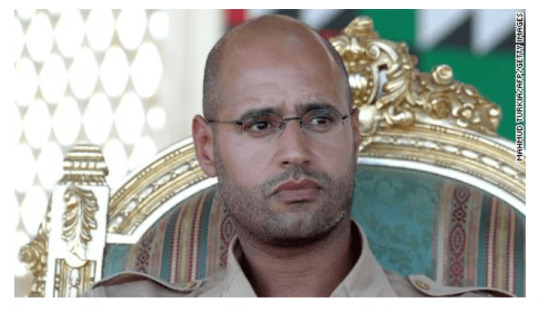
View On WordPress
0 notes
Text
Λιβύη : Τρόμος από τον αέρα - Τούρκοι νεκροί ανάμεσα στους 28 από επίθεση σε στρατιωτική σχολή [ΧΑΡΤΗΣ]
Λιβύη : Τρόμος από τον αέρα – Τούρκοι νεκροί ανάμεσα στους 28 από επίθεση σε στρατιωτική σχολή [ΧΑΡΤΗΣ]
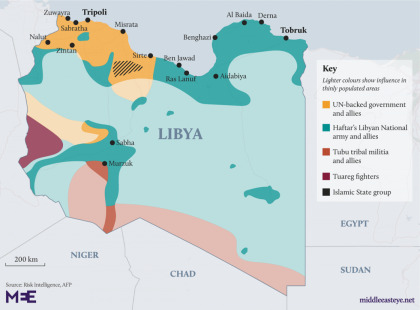
Λιβύη : Τρόμος από τον αέρα, 28 νεκροί από επίθεση σε στρατιωτική σχολή Οι εκπαιδευόμενοι ήταν στο κοιτώνες όταν χτύπησαν τα βλήματα
Λιβύη : Τρόμος από τον αέρα, 28 νεκροί από επίθεση σε στρατιωτική σχολή Οι εκπαιδευόμενοι ήταν στο κοιτώνες όταν χτύπησαν τα βλήματα. Ο αριθμός των νεκρών είναι ήδη υψηλός, αλλά λόγω του αριθμού των τραυματιών, ο στρατός εικάζει ότι ο αριθμός των νεκρών θα μπορούσε…
View On WordPress
#Government of National Accord#Khalifa Haftar#Libyan Air Force#Libyan Civil War#Libyan National Army#Libyan National Army Air Force#Mi-24#Mi-35#Mi-35P#MiG-21#MiG-23#MiG-25#Muammar Gaddafi#R-40#Saif Al Islam#Su-22
0 notes
Text
Λιβύη : Τρόμος από τον αέρα - Τούρκοι νεκροί ανάμεσα στους 28 από επίθεση σε στρατιωτική σχολή [ΧΑΡΤΗΣ]
Λιβύη : Τρόμος από τον αέρα – Τούρκοι νεκροί ανάμεσα στους 28 από επίθεση σε στρατιωτική σχολή [ΧΑΡΤΗΣ]
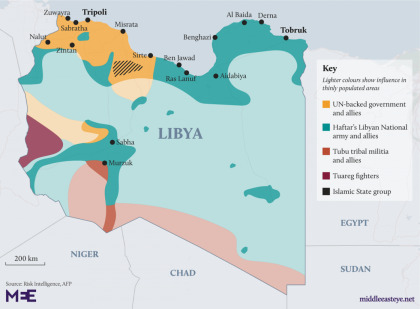
Λιβύη : Τρόμος από τον αέρα, 28 νεκροί από επίθεση σε στρατιωτική σχολή Οι εκπαιδευόμενοι ήταν στο κοιτώνες όταν χτύπησαν τα βλήματα
Λιβύη : Τρόμος από τον αέρα, 28 νεκροί από επίθεση σε στρατιωτική σχολή Οι εκπαιδευόμενοι ήταν στο κοιτώνες όταν χτύπησαν τα βλήματα. Ο αριθμός των νεκρών είναι ήδη υψηλός, αλλά λόγω του αριθμού των τραυματιών, ο στρατός εικάζει ότι ο αριθμός των νεκρών θα μπορούσε…
View On WordPress
#Government of National Accord#Khalifa Haftar#Libyan Air Force#Libyan Civil War#Libyan National Army#Libyan National Army Air Force#Mi-24#Mi-35#Mi-35P#MiG-21#MiG-23#MiG-25#Muammar Gaddafi#R-40#Saif Al Islam#Su-22
0 notes
Text
Λιβύη : Τρόμος από τον αέρα - Τούρκοι νεκροί ανάμεσα στους 28 από επίθεση σε στρατιωτική σχολή [ΧΑΡΤΗΣ]
Λιβύη : Τρόμος από τον αέρα – Τούρκοι νεκροί ανάμεσα στους 28 από επίθεση σε στρατιωτική σχολή [ΧΑΡΤΗΣ]

Λιβύη : Τρόμος από τον αέρα, 28 νεκροί από επίθεση σε στρατιωτική σχολή Οι εκπαιδευόμενοι ήταν στο κοιτώνες όταν χτύπησαν τα βλήματα
Λιβύη : Τρόμος από τον αέρα, 28 νεκροί από επίθεση σε στρατιωτική σχολή Οι εκπαιδευόμενοι ήταν στο κοιτώνες όταν χτύπησαν τα βλήματα. Ο αριθμός των νεκρών είναι ήδη υψηλός, αλλά λόγω του αριθμού των τραυματιών, ο στρατός εικάζει ότι ο αριθμός των νεκρών θα μπορούσε…
View On WordPress
#Government of National Accord#Khalifa Haftar#Libyan Air Force#Libyan Civil War#Libyan National Army#Libyan National Army Air Force#Mi-24#Mi-35#Mi-35P#MiG-21#MiG-23#MiG-25#Muammar Gaddafi#R-40#Saif Al Islam#Su-22
0 notes
